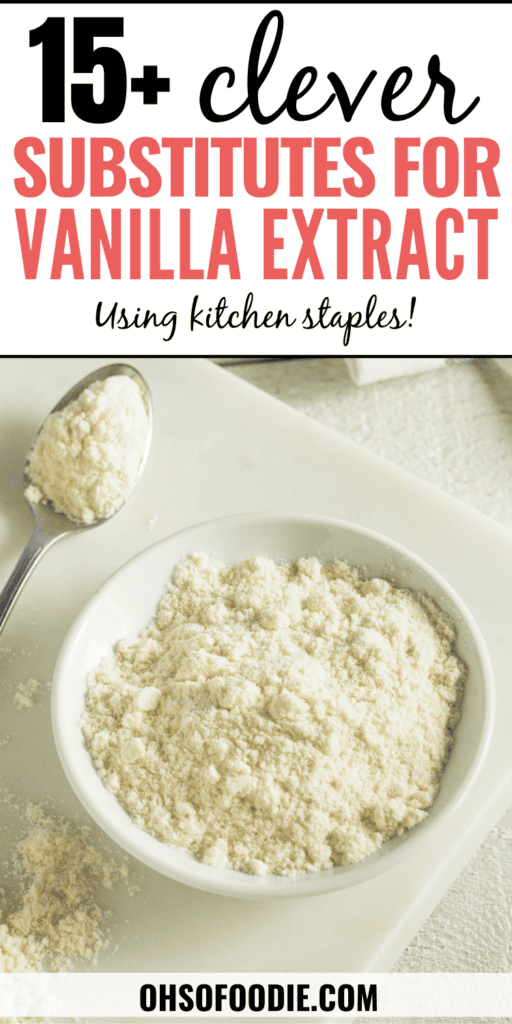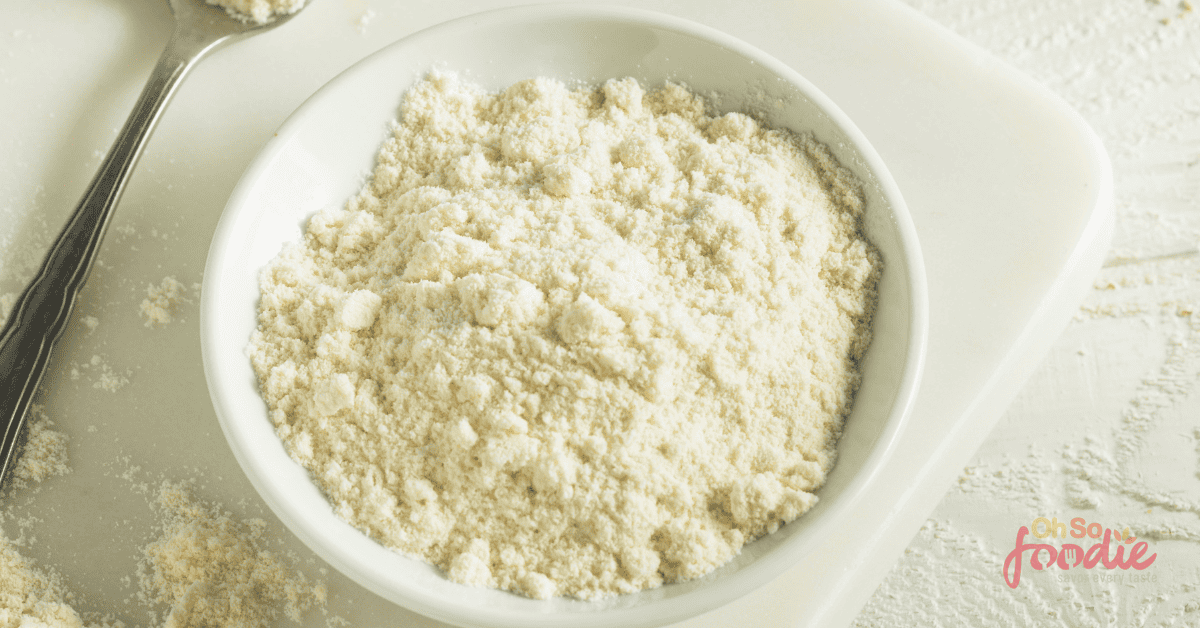Last Updated on November 13, 2023 by Toya
Vanilla extract is a common ingredient used in baking and cooking to add flavor and aroma to your favorite recipes. However, it can be quite expensive and, in some cases, difficult to find. Thankfully, there are plenty of alternatives to use as a substitute for vanilla extract.

So, whether you’re out of vanilla extract or simply looking to switch things up in the kitchen, these vanilla extract substitutes will help enhance the flavors in your dishes. From natural options like vanilla bean and vanilla paste to unique flavors like coconut extract and butterscotch extract, you’ll find a substitute that’s perfect for your needs.
Substitutes for vanilla extract
Vanilla Bean
If you’re looking for a natural substitute for vanilla extract, vanilla beans are a great option. These have a delicious and intense vanilla flavor.
To use vanilla beans as a substitute, simply split the bean lengthwise and scrape the seeds out with a knife. Add the seeds to your recipe in place of the vanilla extract. You can also place the empty vanilla pod in a jar with sugar to make your own homemade vanilla sugar.
Keep in mind that using vanilla beans can be more expensive than vanilla extract, but the natural flavor is worth it. Additionally, vanilla beans have a longer shelf life than vanilla extract, and you can store them in a cool, dry place for several months.
Next time you’re out of vanilla extract, give vanilla beans a try. You might just prefer the natural and intense flavor it brings to your dishes.
Vanilla Paste
Vanilla paste is a concentrated form of vanilla that can be used as a substitute for vanilla extract. It is made from vanilla beans that are ground into a thick paste, which is then mixed with sugar and a natural thickener. The result is a thick and luscious syrup that has a strong vanilla flavor and aroma.
The texture of vanilla paste is thicker than that of vanilla extract, and it has a deeper and more concentrated flavor. This makes it perfect for recipes where you want to add a strong vanilla taste, such as in custards, ice creams, and baked goods.
When substituting vanilla paste for vanilla extract, use one tablespoon of vanilla paste for every one tablespoon of vanilla extract. Keep in mind that vanilla paste contains sugar, so you may need to adjust the other sweeteners in your recipe accordingly.
Vanilla paste is a convenient option for those who don’t have access to vanilla beans or want a more intense vanilla flavor. It is also a great addition to your pantry if you love baking and want to enhance the flavors in your dishes.
Vanilla Powder
If you’re looking for a substitute for vanilla extract that is easy to store and use, vanilla powder is a great option. Made from ground vanilla beans, vanilla powder is a convenient and versatile ingredient that can be used in a variety of recipes.
One of the benefits of using vanilla powder is its long shelf life. Unlike vanilla extract, which can spoil if not stored properly, vanilla powder can last for up to three years when stored in an airtight container in a cool, dry place.
Vanilla powder is also a great substitute for vanilla extract when you don’t have access to the liquid form. It can be used in the same quantity as vanilla extract, but keep in mind that it may not provide the same level of liquid needed in certain recipes.
When using vanilla powder, it’s important to note that it has a more concentrated flavor than vanilla extract. You may need to adjust the amount depending on your recipe and personal preference.
The Spruce Eats recommends using ½ teaspoon of powder for every 1 teaspoon of extract.
Vanilla Sugar
Vanilla sugar is a simple and sweet substitute for vanilla extract in your cooking and baking. It is made by infusing sugar with the seeds of vanilla beans, which adds a subtle vanilla flavor to your recipes.
You can use vanilla sugar as a one-to-one replacement for vanilla extract in your recipes. It is perfect for adding a sweet and delicate vanilla flavor to desserts such as cakes, cookies, and custards.
Vanilla sugar is also easy to make at home. Simply slice open a vanilla bean, scrape out the seeds, and mix them with sugar. Let the mixture sit for a few days to allow the flavors to infuse before using it in your recipes.
Whether you’re looking to add a touch of sweetness or enhance your recipes with a subtle vanilla flavor, vanilla sugar is a great alternative to vanilla extract.
Almond Extract
If you’re out of vanilla extract and want a substitute with a similar flavor profile, almond extract is a great option to consider. It adds a nutty taste to your dishes and can enhance the flavors in your baked and cooked recipes.
To use almond extract as a substitute for vanilla extract, use a 1:1 ratio. For example, if your recipe calls for 1 teaspoon of vanilla extract, use 1 teaspoon of almond extract instead.
Maple Syrup
If you’re looking for a natural substitute for vanilla extract, look no further than maple syrup. This sweet and flavorful syrup can be used in many recipes, including baked goods. It’s especially useful when you run out of vanilla extract and need a quick substitute.
Maple syrup is a great substitute for vanilla extract in pancakes, waffles, and other breakfast foods. It can also be used in baking recipes, such as cookies, cakes, and bread.
When using maple syrup as a substitute for vanilla extract, use it in a 1:1 ratio. To some people, the scent of maple syrup and its hint of sweetness is reminiscent of vanilla extract, so it make a great replacement option.
Bourbon or Rum
If you’re looking to add a rich and complex flavor to your desserts, consider substituting vanilla extract with bourbon. This alcoholic spirit complements the sweet flavors of desserts with its distinct taste and aroma.
Bourbon is a type of whiskey that is made from at least 51% corn and aged in charred oak barrels. It has a smooth, slightly sweet taste with notes of vanilla, caramel, and oak, and is often used to make vanilla extract.
When substituting vanilla extract with bourbon, remember to use them in moderation, as they can be overpowering. Start with a small amount and adjust to taste. Personally, I’d start with a little less than a 1:1 ratio, then adjust if needed.
Bourbon is the perfect substitute for vanilla extract in recipes like cakes, cookies, and custards.
Coffee Syrup
If you don’t mind adding a bit of coffee flavor to your recipes, coffee syrup can be a great substitute for vanilla extract. It is a concentrated liquid made from coffee beans and sugar, giving it a sweet and bold flavor that can enhance the taste of your dishes.
Coffee syrup can be used as a substitute for vanilla extract in a variety of recipes, particularly in baked goods and desserts such as cookies, cakes, and ice cream. It can also be added to hot or cold beverages for an extra boost of coffee flavor.
When using coffee syrup as a substitute for vanilla extract, it is important to consider the amount required. Start by using a small quantity or a 1:1 ratio, and gradually increase until you achieve the desired taste, if needed. Remember, coffee syrup has a strong flavor, so use it sparingly.
Anise Extract
If you want to add a unique flavor to your recipes, anise extract can be used as a substitute for vanilla extract. With its licorice taste, anise extract adds a distinct flavor to your dishes. However, it is important to use anise extract sparingly, as it has a strong taste that can easily overpower other flavors in your recipe.
Anise extract is an okay substitute for vanilla extract in baking and dessert recipes. It pairs well with chocolate, fruits, and even savory dishes like roasted meats and vegetables. Anise extract can also be used in drinks like hot chocolate or coffee to add a bold and rich flavor.
However, many people aren’t a fan of this flavor. So, if you’re going to try it, start with a small amount and assess if you like it or not before proceeding.
Orange or Lemon Extract
Looking to elevate the flavors in your baking or cooking? Why not try using orange or lemon extract as a substitute for vanilla extract? These citrus extracts can add a unique and refreshing twist to your dishes, making them stand out from the rest.
Orange or lemon extract are perfect substitutes for vanilla extract when you want to add a citrusy flavor to your recipes. They work well in desserts such as cakes, cookies, and pies, as well as in savory dishes like marinades and sauces.
When using orange or lemon extract as a substitute for vanilla extract, keep in mind that they have a strong flavor and will change the flavor of the finished recipe.
Coconut Extract
Coconut extract is an excellent substitute for vanilla extract in baking and cooking. One of the most significant advantages of using coconut extract is its unique tropical flavor, which adds a rich and creamy taste to your dishes. This makes it an excellent alternative in soft, creamy recipes.
Hazelnut Extract
If you want to use another type of extract in your baking recipes, you can switch it up with hazelnut extract. With its distinctive nutty flavor, hazelnut extract can add a unique twist to your desserts.
When substituting vanilla extract with hazelnut extract, keep in mind that the latter has a stronger taste. As a general rule of thumb, use half the amount of hazelnut extract as the recipe calls for vanilla extract. This will ensure that the flavor is not overpowering and perfectly balanced.
There are endless possibilities for incorporating hazelnut extract into your baking. It can liven up a classic chocolate cake or add depth to a simple sugar cookie recipe. Try it out in your morning pancakes or waffles for a unique breakfast treat!
Whether you’re looking to add a subtle nutty flavor or a bold hazelnut taste, hazelnut extract is a fantastic substitute for vanilla extract. It’s easy to use and a great way to experiment with new flavors in your baking.
Butterscotch Extract
If you’re looking for a unique flavor to replace vanilla extract in your baking recipes, butterscotch extract may be just what you need.
This delicious extract adds sweet and buttery notes to your desserts, giving them a distinct flavor that is sure to please.
Butterscotch extract pairs well with cinnamon, and vanilla flavors.
A good rule of thumb is to use about half the amount of butterscotch extract as you would use vanilla extract. This will ensure that the butterscotch flavor is present but not overpowering.
You can also experiment with using butterscotch extract in combination with other flavors, such as chocolate or coffee, to create even more complex and delicious desserts.
Overall, butterscotch extract is a fantastic alternative to vanilla extract if you’re looking to add a unique twist to your baked goods. With its sweet and buttery flavor, it’s sure to impress even the most discerning taste buds.
Found anything you like? Let me know in the comments below.
